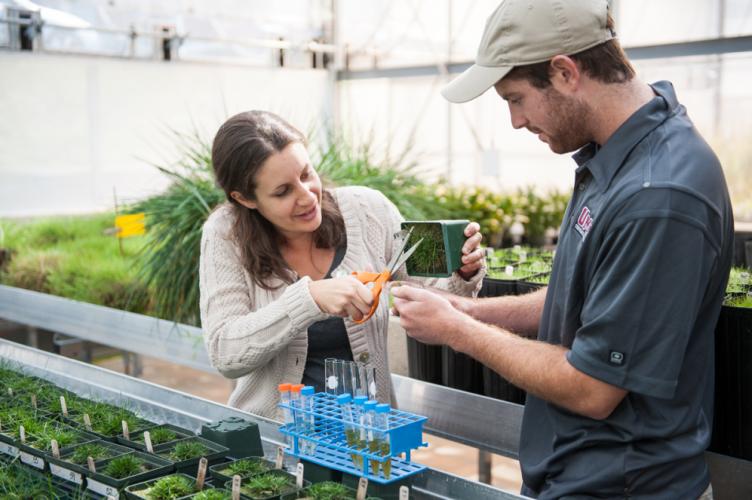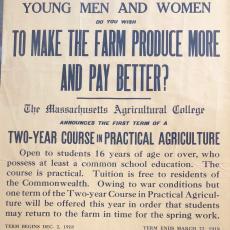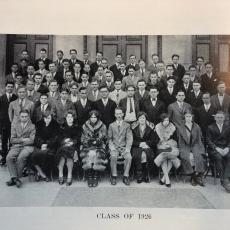In Our Spotlight
Growing Massachusetts Farmers (and Others) for 100 Years
Early Seeds Planted in Fertile Soil
“Young Men and Women, Do You Wish to Make the Farm Produce More and Pay Better?”
In 1918, a new endeavor, called the Stockbridge School of Agriculture (SSA), was launched at the Massachusetts Agricultural College in Amherst. The School was well ahead of its time, inviting women as well as men to sign up for its two-year course in practical agriculture. That was the start of what today is a well-respected school of the University of Massachusetts Amherst. One hundred years after it began, 10,000 alumni can attest to the fact that those early seeds planted in fertile soil have produced an abundant crop of scholars, farmers, scientists, foresters, and business owners.
The opportunities to study at the Stockbridge School of Agriculture have expanded well beyond 1918’s initial course offerings. SSA’s first degree programs included poultry, floriculture and animal husbandry; now, a student can also choose to major in turf grass management, arboriculture, sustainable food and farming, and commercial horticulture topics including landscape contracting.
Some of the biggest changes of the last century have happened very recently. In 2012, Stockbridge set about to restructure by adding a four-year bachelor of science degree program to its two-year associate of science program. Now, the School offers six associate of science degrees, four bachelor of science degrees, and graduate education at the master’s and doctoral levels. Stockbridge students are involved in a broad range of activities, including clubs, intramural sports, residential activities, community service activities, national competition teams, and faculty research projects. SSA’s associate's programs remain the campus’ only two-year degree offerings.
Director Wesley Autio and his team are working hard to expand visibility of the School and to become more well-known throughout Massachusetts and the region. Carrying the legacy of SSA into the future is no small task, but faculty, staff, and alumni seem up to the challenge.
Who was Levi Stockbridge?
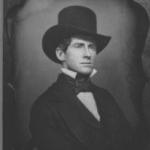 By all accounts, Levi Stockbridge was a mountain of a man, both in person and in his work. Born in 1820 in Hadley, Massachusetts, he was a lifelong farmer, served three terms in the Massachusetts State Legislature, 12 years on the state board of agriculture and 32 years as a state cattle commissioner. He was instrumental in the early formation of Massachusetts Agricultural College (Mass Aggie or M.A.C.) now known as the University of Massachusetts Amherst. Stockbridge had little confidence in “textbook agriculture” and valued, instead, practical experience and hard work, to which he was no stranger. First college farm superintendent and one if its first professors, he also served as the fifth president of Mass Aggie.
By all accounts, Levi Stockbridge was a mountain of a man, both in person and in his work. Born in 1820 in Hadley, Massachusetts, he was a lifelong farmer, served three terms in the Massachusetts State Legislature, 12 years on the state board of agriculture and 32 years as a state cattle commissioner. He was instrumental in the early formation of Massachusetts Agricultural College (Mass Aggie or M.A.C.) now known as the University of Massachusetts Amherst. Stockbridge had little confidence in “textbook agriculture” and valued, instead, practical experience and hard work, to which he was no stranger. First college farm superintendent and one if its first professors, he also served as the fifth president of Mass Aggie.
According to reports, he was a much beloved teacher. He was also an active researcher, developing some of the earliest commercial fertilizers, the proceeds from which helped stabilized the finances of the early Mass Aggie. William Bowker, M.A.C. graduate in the first “pioneer” class of 1871 and later fertilizer magnate, offered up his eulogy. He wrote, “....the impression which he made upon me was that he was one of our kind — an approachable man, who could drive a yoke of oxen or preside at a town meeting with equal ease.”
In 1893, a two-year course was organized at M.A.C. However, it was not until 1918 that the Massachusetts Legislature resolved to officially establish the "Two-year Course in Practical Agriculture." In recognition of his significant contribution to Mass Aggie, the college trustees honored the memory of Levi Stockbridge, who had died in 1904, and named the two-year program the Stockbridge School of Agriculture.
Stockbridge Descendants Share Their Stories
 Family historian Kay Stockbridge believes that her husband’s ancestor Levi would be pleased at what has happened with his namesake school over the past 100 years. “He would have been very proud of the evolution of the school… well, as much pride as his reserved New England personality would allow,” the last added with a twinkle in her eye.
Family historian Kay Stockbridge believes that her husband’s ancestor Levi would be pleased at what has happened with his namesake school over the past 100 years. “He would have been very proud of the evolution of the school… well, as much pride as his reserved New England personality would allow,” the last added with a twinkle in her eye.
When asked to imagine his reaction to ways in which the school has grown beyond a concentration on agriculture, with its expansion into turf management, horticulture and arboriculture, she was quick to respond. “He would have seen it as a natural evolution and one that was in keeping with the times. It would have suited him and met with his approval.” Levi Stockbridge was often quoted as saying, “Feed the plant and the plant will feed you.” Planting a school in his honor that continues to produce graduates who “feed us” and care for our natural world would have thrilled him, she added.
 Great-grandson Edward O. Stockbridge (UMass ’56) followed in his ancestor’s agricultural footsteps. He enjoyed a long career working for the U.S. Department of Agriculture as an animal and plant inspector. Although he never had a chance to meet his forbear, Edward is happy to have inherited a precious gold cane given to Levi by his students.
Great-grandson Edward O. Stockbridge (UMass ’56) followed in his ancestor’s agricultural footsteps. He enjoyed a long career working for the U.S. Department of Agriculture as an animal and plant inspector. Although he never had a chance to meet his forbear, Edward is happy to have inherited a precious gold cane given to Levi by his students.
Edward said, “Levi would have to be delighted that SSA has expanded into new areas of study. Times change and more things become prominent, so we need people to study and educate others to improve everything. Levi was a pretty thoughtful person. He helped to develop successful fertilizers and in his generosity, he gave away all his formulas to Mass Aggie. He said he just wanted his family to be comfortable.” With a chuckle, he added, “If he hadn’t been so magnanimous, I might be the fertilizer king by now.” The giving nature of Levi Stockbridge provided stability for the new college in its early years.
The People of Stockbridge Today
Dedicated Teachers and Researchers
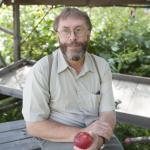 Wesley Autio has achieved an impressive record of research related to growing fruit trees. Specifically, he possesses a wealth of knowledge about apple and peach rootstocks, controlling the growth of apple trees with mechanical and hormonal approaches, and chemical thinning of peaches. Currently, he serves as director of the Stockbridge School of Agriculture. In that capacity, he leads efforts to strengthen educational, research, and outreach programs from the Stockbridge School. Autio continues to interact regularly with tree-fruit farmers and the many individuals interested in tree fruit in the landscape. Because of his extensive experience with experimental design and statistical analysis, he is involved with many research projects and serves on numerous graduate committees with the purpose of providing guidance in design and analysis.
Wesley Autio has achieved an impressive record of research related to growing fruit trees. Specifically, he possesses a wealth of knowledge about apple and peach rootstocks, controlling the growth of apple trees with mechanical and hormonal approaches, and chemical thinning of peaches. Currently, he serves as director of the Stockbridge School of Agriculture. In that capacity, he leads efforts to strengthen educational, research, and outreach programs from the Stockbridge School. Autio continues to interact regularly with tree-fruit farmers and the many individuals interested in tree fruit in the landscape. Because of his extensive experience with experimental design and statistical analysis, he is involved with many research projects and serves on numerous graduate committees with the purpose of providing guidance in design and analysis.
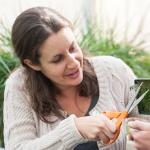 Associate professor Michelle DaCosta spends her days absorbed in research training students for careers in the turf industry. She says the biggest issues today in her field are use of water, fertilizers and reduction of pesticides. Researchers and scientists like DaCosta are working hard to enhance the sustainability of businesses who depend on healthy turf grass, including landscapers, sports and recreational turf and golf courses. She said, “We are looking for new plant species and more efficient technology so the grasses we grow require less input (water and fertilizers). Enhancing sustainability of the green industry is our goal.”
Associate professor Michelle DaCosta spends her days absorbed in research training students for careers in the turf industry. She says the biggest issues today in her field are use of water, fertilizers and reduction of pesticides. Researchers and scientists like DaCosta are working hard to enhance the sustainability of businesses who depend on healthy turf grass, including landscapers, sports and recreational turf and golf courses. She said, “We are looking for new plant species and more efficient technology so the grasses we grow require less input (water and fertilizers). Enhancing sustainability of the green industry is our goal.”
She relays, with a good amount of pride, that former students are in charge of the grounds at top facilities in the country. For example, the National Mall in Washington D.C. is being managed by Michael Stachowicz, a turf program alum. And alum Anthony Ruggiero supervises the Rose Kennedy Greenway in Boston. DaCosta says, “We have had 100% job placement in the last five years. These people are becoming the stewards of the environment.”
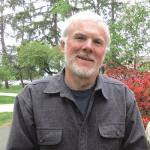 Professor John Gerber has been at UMass since 1992. In that time, he describes a huge uptick in the interest in practical farming and sustainable food and farming degree programs. When the bachelor of science degree in sustainable food and farming was created in 2000, only five students enrolled. By 2017, 150 students signed up for the popular degree program. In the past, students who enrolled had grown up on farms. Today most are not from farm families, but are interested in changing the food system. About a third want to farm, but the others are focused on community-based education, public policy, food advocacy, hunger and nutrition, and other careers related to sustainable farming. In response to the increased student demand, many new classes have been added over the past few years (in addition to traditional agricultural courses in soil science, vegetable production, etc.), such as: Community Food Systems, Introduction to Permaculture, Practical Beekeeping, Food Waste and Recovery and more. Click here for more information.
Professor John Gerber has been at UMass since 1992. In that time, he describes a huge uptick in the interest in practical farming and sustainable food and farming degree programs. When the bachelor of science degree in sustainable food and farming was created in 2000, only five students enrolled. By 2017, 150 students signed up for the popular degree program. In the past, students who enrolled had grown up on farms. Today most are not from farm families, but are interested in changing the food system. About a third want to farm, but the others are focused on community-based education, public policy, food advocacy, hunger and nutrition, and other careers related to sustainable farming. In response to the increased student demand, many new classes have been added over the past few years (in addition to traditional agricultural courses in soil science, vegetable production, etc.), such as: Community Food Systems, Introduction to Permaculture, Practical Beekeeping, Food Waste and Recovery and more. Click here for more information.
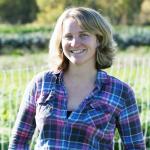 Amanda Brown is a lecturer on the SSA faculty who can usually be found with her sleeves rolled up, working the farm with students eager to develop a relationship with the land. Early in her professional career, Amanda focused on sustainable farming practices for vegetable and specialty crops as a researcher and educator with UMass Extension's Agriculture & Landscape Program. During that time, she co-founded the UMass Student Farming Enterprise program. Now in its twelfth season, the farm grows over 40 different vegetable crops supplying the campus community with student-grown vegetables through a 150-member CSA program, weekly farmers market, and through wholesale sales to others including UMass Dining and Big Y Foods. Recent accomplishments include the completion of a new wash and pack station at the Agricultural Learning Center, which she also directs.
Amanda Brown is a lecturer on the SSA faculty who can usually be found with her sleeves rolled up, working the farm with students eager to develop a relationship with the land. Early in her professional career, Amanda focused on sustainable farming practices for vegetable and specialty crops as a researcher and educator with UMass Extension's Agriculture & Landscape Program. During that time, she co-founded the UMass Student Farming Enterprise program. Now in its twelfth season, the farm grows over 40 different vegetable crops supplying the campus community with student-grown vegetables through a 150-member CSA program, weekly farmers market, and through wholesale sales to others including UMass Dining and Big Y Foods. Recent accomplishments include the completion of a new wash and pack station at the Agricultural Learning Center, which she also directs.
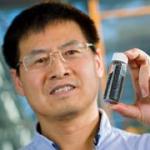 Baoshan Xing, professor of environmental and soil chemistry, conducts world-changing research as one of the nation’s top environmental scientists. He has recently held the distinction of having his publications cited fourth in the world and is ranked in the top one-percent of cited authors for journals in environment and ecology. Particular interests include environmental fate and ecotoxicity of engineered nanoparticles, interactions between organic compounds and natural organic matter, biochar characterization and soil quality and sorption mechanisms of organic chemical in soils and sediments, among others.
Baoshan Xing, professor of environmental and soil chemistry, conducts world-changing research as one of the nation’s top environmental scientists. He has recently held the distinction of having his publications cited fourth in the world and is ranked in the top one-percent of cited authors for journals in environment and ecology. Particular interests include environmental fate and ecotoxicity of engineered nanoparticles, interactions between organic compounds and natural organic matter, biochar characterization and soil quality and sorption mechanisms of organic chemical in soils and sediments, among others.
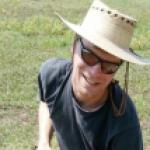 Marco Keiluweit, assistant professor of soil and climate change, researches the response of soil processes to climate change. Keiluweit’s laboratory studies plant-soil interactions, especially how rhizogenic weathering affects C dynamics in the subsoil. He specializes in using fine-scale microsensor techniques as well as novel imaging and spectroscopy analyses to characterize interactions among carbon compounds, microbes and minerals in a diverse array of soil microhabitats. The main goal of his research is to understand the effect of changing environmental conditions on fundamental ecological mechanisms that control the cycling and storage of carbon.
Marco Keiluweit, assistant professor of soil and climate change, researches the response of soil processes to climate change. Keiluweit’s laboratory studies plant-soil interactions, especially how rhizogenic weathering affects C dynamics in the subsoil. He specializes in using fine-scale microsensor techniques as well as novel imaging and spectroscopy analyses to characterize interactions among carbon compounds, microbes and minerals in a diverse array of soil microhabitats. The main goal of his research is to understand the effect of changing environmental conditions on fundamental ecological mechanisms that control the cycling and storage of carbon.
 Geunhwa Jung is professor of turfgrass pathology, plant breeding, and genetics. Jung’s research is impressive, with potential ramifications beyond turf grass pathology. His mission is to extend the boundaries of the University, bringing education and technical support to people in every region of the state. Jung is working to reformulate current research data into layperson terms and to provide science-based information to clientele. Currently, he is researching fungicide resistance similar to cancer cell research for chemotherapy, exploring genetic markers. His work could lead to positive effects on human health.
Geunhwa Jung is professor of turfgrass pathology, plant breeding, and genetics. Jung’s research is impressive, with potential ramifications beyond turf grass pathology. His mission is to extend the boundaries of the University, bringing education and technical support to people in every region of the state. Jung is working to reformulate current research data into layperson terms and to provide science-based information to clientele. Currently, he is researching fungicide resistance similar to cancer cell research for chemotherapy, exploring genetic markers. His work could lead to positive effects on human health.
Proud Alumni
 Dwight H. Snead was introduced to the landscaping industry by his father Grievous Snead, Sr., who supported his wife, eight sons, and six daughters by doing small landscaping jobs. After gaining valuable experience and knowledge by working full-time in the summer months for his father’s business, Snead was admitted to the University of Massachusetts Amherst where he majored in landscape operations at the Stockbridge School of Agriculture, earning his diploma in 1958.
Dwight H. Snead was introduced to the landscaping industry by his father Grievous Snead, Sr., who supported his wife, eight sons, and six daughters by doing small landscaping jobs. After gaining valuable experience and knowledge by working full-time in the summer months for his father’s business, Snead was admitted to the University of Massachusetts Amherst where he majored in landscape operations at the Stockbridge School of Agriculture, earning his diploma in 1958.
He is the owner of Dwight Snead Construction Company, Inc. one of the leading, full-service, minority-owned, heavy site construction firms in the southeast. As a graduate of SSA, Snead says that he felt well-prepared for his field, attributing much of his success to his rich education. Over 40 years, he has built a business that employs 45 (including his three sons). Snead Construction, headquartered in Glen Allen, Virginia, prepares site work for new buildings including new roads, concrete sidewalks, underground utility site prep and more.
 Dennis Mareb, owner of Windy Hill Farm in Great Barrington, is living his dream. As a young person, he always liked to be outdoors, but was not sure he could find an educational avenue that would land him in a job far away from a desk. Mareb’s life changed when he attended Stockbridge School of Agriculture, where he gained the confidence to own his own farm. He said, “Attending Stockbridge encouraged me to like school again. I finished and then obtained a further degree with an emphasis on open space management.” With a Lotta Crabtree loan in his pocket, he and his wife Judy bought an old dairy farm in 1980 in Great Barrington and began what has become a robust landscape business in the Berkshires. Recently, he was able to protect 34 acres through an agricultural protection restriction.
Dennis Mareb, owner of Windy Hill Farm in Great Barrington, is living his dream. As a young person, he always liked to be outdoors, but was not sure he could find an educational avenue that would land him in a job far away from a desk. Mareb’s life changed when he attended Stockbridge School of Agriculture, where he gained the confidence to own his own farm. He said, “Attending Stockbridge encouraged me to like school again. I finished and then obtained a further degree with an emphasis on open space management.” With a Lotta Crabtree loan in his pocket, he and his wife Judy bought an old dairy farm in 1980 in Great Barrington and began what has become a robust landscape business in the Berkshires. Recently, he was able to protect 34 acres through an agricultural protection restriction.
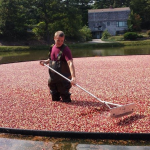 Keith Boyle (SSA ’10) is a horticulture instructor at Upper Cape Technical High School (UCT) in Bourne, Mass. As Stockbridge School of Agriculture looks to position itself for the next century, it has begun to give a hand up to high school students in agricultural high schools across the Commonwealth. In an agreement between SSA and UCT, Boyle offers three courses through a dual enrollment plan: greenhouse management, sustainable agriculture and irrigation and drainage for which his students can receive college credit. According to Boyle, UCT students enroll in the courses either to get ahead and potentially graduate early or to transfer college credits. A distinct financial advantage is that UCT pays for the college tuition credits while these students are still in high school. SSA is already working with other technical high schools to offer similar opportunities.
Keith Boyle (SSA ’10) is a horticulture instructor at Upper Cape Technical High School (UCT) in Bourne, Mass. As Stockbridge School of Agriculture looks to position itself for the next century, it has begun to give a hand up to high school students in agricultural high schools across the Commonwealth. In an agreement between SSA and UCT, Boyle offers three courses through a dual enrollment plan: greenhouse management, sustainable agriculture and irrigation and drainage for which his students can receive college credit. According to Boyle, UCT students enroll in the courses either to get ahead and potentially graduate early or to transfer college credits. A distinct financial advantage is that UCT pays for the college tuition credits while these students are still in high school. SSA is already working with other technical high schools to offer similar opportunities.
Before he even received his college diploma, thanks to an interest-free Lotta Crabtree loan and help from cranberry grower Peter Oakley, he purchased a small bog, K.D.B. Cranberries in Hanson. Boyle says, “Stockbridge School certainly helped shape my career and love for the vocational/agricultural industries here in Mass.”
